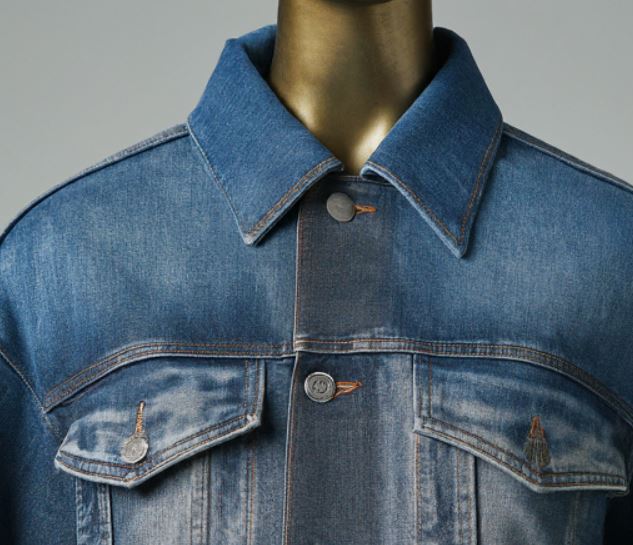Is denim going green? Discover groundbreaking innovations in eco-friendly dyeing, faster production, and creative freedom for designers at Kingpins Amsterdam.
 |
| Chemical companies and machinery firms join forces to create a sustainable and efficient future for denim. |
The world of denim, once synonymous with environmental strain and sluggish production cycles, is undergoing a metamorphosis. At the recently concluded Kingpins Amsterdam trade show, chemical suppliers and machinery manufacturers unveiled a wave of groundbreaking innovations that paint a picture of a future denim landscape that is as ecologically responsible as it is remarkably efficient and creatively liberating.
Sustainability emerged as a central theme, with companies showcasing groundbreaking solutions to replace traditional, often polluting, processes. Italy's Officina39 stole the show with Easyindigo, a two-phase garment dyeing system designed to simplify and streamline indigo application. Partnering with machinery giant Tonello, Easyindigo utilizes a novel chemical package that minimizes dye migration and lowers processing temperatures. This translates to significant water conservation, a crucial step towards a cleaner denim production chain.
Officina39 wasn't alone in its commitment to a greener future. Tonello's O Bleach technology is redefining black denim finishing. This innovative approach achieves the coveted bleached effect without resorting to harsh chemicals, a significant step towards a cleaner denim production chain. Similarly, Soko, another key player in the chemical space, showcased Lumia, a single-step ozone-based solution for fading denim. This eliminates the need for hazardous chemicals like potassium permanganate, a welcome change for environmentally conscious consumers and manufacturers alike.
Beyond Green: Speeding Up Without Sacrificing Quality
The focus on efficiency wasn't overshadowed by the sustainability push. Collaboration between chemical suppliers and machinery firms is yielding impressive results in terms of faster production cycles. Easyindigo seamlessly integrates with Tonello's DyeMate technology, an automated indigo garment dyeing process. DyeMate delivers consistent results with reduced lead times and a smaller chemical footprint, a win-win for both speed and sustainability. Additionally, Soko's "Denim Pharmacy" offers a suite of targeted solutions to address specific production bottlenecks. This modular approach allows manufacturers to streamline workflows and optimize production processes, ensuring faster turnaround times without compromising on quality.
Innovation extends beyond just streamlining production. New technologies are empowering designers and brands with greater creative control. Tonello's The Laser with Ripper Mode allows for the creation of distressed denim effects without compromising fabric integrity. This opens doors for designers seeking unique and on-trend looks, ushering in a new era of creative expression in denim design. Similarly, Soko's Soko Glossy offers a manual solution for creating a variety of coated denim finishes, ranging from solid colours to vintage leather looks. This approach grants manufacturers greater flexibility and control during the garment finishing stage, fostering a more dynamic design environment where creativity can truly flourish.
Beyond the Latest Fad: A Collaborative Spirit Emerges
A noteworthy development at Kingpins was the spirit of collaboration that permeated the event. Chemical suppliers and machinery firms are no longer operating in silos. Instead, companies are forging strategic partnerships to develop solutions that are not only innovative but also seamlessly integrated. The Easyindigo and DyeMate pairing from Officina39 and Tonello exemplifies this collaborative spirit, offering a complete solution for efficient and sustainable indigo dyeing. This shift towards collaboration bodes well for the future of the denim industry, fostering faster innovation and streamlined production processes.
Despite the undeniable progress, some hurdles remain. Brands, ever mindful of cost pressures, are hesitant to fully embrace sustainable innovations that may come with a premium price tag. Educating brands about the long-term benefits of sustainable practices, such as reduced water consumption and waste generation, will be crucial in bridging this gap. Additionally, an "overproduction of innovation" might lead to delays in adoption as brands grapple with a plethora of new options. Industry-wide standards and certifications for sustainable denim production processes can help to streamline this process and give brands greater confidence in their choices.
A Glimpse into the Future: Denim 2.0
The denim industry's commitment to change is clear. By prioritizing sustainability, optimizing production processes, and empowering designers with cutting-edge technologies, the sector is well-positioned to navigate the demands of a rapidly evolving fashion landscape. Kingpins Amsterdam offered a glimpse into a future where denim thrives not just as a fashion staple, but as a leader in responsible and innovative manufacturing.
This denim 2.0 is poised to be not only kind to the environment but also remarkably efficient, creatively liberating, and ultimately, even more stylish. Consumers can expect a wider variety of eco-friendly denim options with unique finishes and faster turnaround times, all without compromising on the quality and durability that denim is known for. The future of denim is bright, sustainable, and bursting with creative potential.